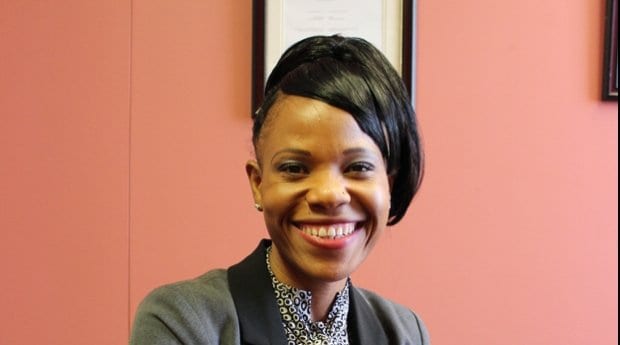There’s a new lawyer in town.
Concillia Muonde, the former public education coordinator for the Sexual Assault Support Centre of Ottawa, has graduated from law school and set up her own practice at 331 Cooper St, the same building that houses Pink Triangle Services (PTS).
In this edited interview, Muonde discusses how her passion for social justice led her to the legal profession and her interest in representing LGBT clients.
Xtra: Why did you decide to become a lawyer?
Concillia Muonde: I come from a really large family. I’m one of eight kids, the middle child, and I just felt like life was unfair for me. I remember when I found out there was a way of solving conflicts in the world, I knew I wanted to be part of that. That’s really my motivation. As I got older, I realized a lot of things that people go through in life have legal implications. I was a social worker before I became a lawyer. In social issues — poverty, homelessness — there are a lot of legal implications in those spaces, so I thought, Why not get this [legal] training and become better equipped to address these issues rather than simply supporting [clients] in this one way?
How does being LGBT affect a person’s experience with the judicial system?
The Charter of Rights and Freedoms is one big tool that has really helped the LGBT community in realizing some of the benefits of the law. However, a law simply existing doesn’t mean the experience of someone going through it will be equal. For example, like walking into a lawyer’s office and talking about your spousal separation: normally, the assumption is if the person is presenting as a woman, then the spouse must be a man. That’s a wrong assumption, as we know. Once a false assumption has been made, the client might question if the lawyer can understand what their concerns really are. The concerns that people bring and how they make decisions really depend on their lived experiences. Living your life in that [LGBT] identity does not have the same implications as someone who is heterosexual, for whom the law seems to be very favourable toward throughout history. The history of the legal system has been one of evolution, so it will take a lot of evolution in the way the law is practised.
Why is it important to you to reach out to the LGBT community?
My interest has always been in social justice. We all have to recognize our value as human beings, and if we do acknowledge our differences, we can embrace our diversity and move forward as a species. My reasoning for anything I’ve done has always been influenced by my own experiences. Working in violence against women was a result of my having benefited from those support services, so I chose to contribute. There is a part of me that has a personal interest in the LGBT community, but because of the diversity within the community, I don’t speak for everybody. I still have to earn my way. I still have to earn the trust of the clients who come to me.
Do you identify as queer?
I do, with a very big disclaimer that it’s just the beginning of the conversation, and, if anything, I still have to earn a client’s respect. The lawyer-client relationship is like anything else. There needs to be a bond. If you don’t feel like you get along with your lawyer, it’s not worthwhile. Your legal issues are very personal. Unless there’s trust, simply identifying as [queer] isn’t enough.
In addition to family law, you’re interested in legal issues around mental health?
I am, and I think that really comes from the Sexual Assault Support Centre of Ottawa. People who face marginalization are often misunderstood. A lot of that misunderstanding is not because people don’t care, but because it’s really something that you need to be involved in for a long time to gain that understanding. Having gone through that experience of supporting women dealing with mental-health issues and applying for disability benefits, I thought this was a natural transition for me to get involved in, although in a very different way. I’m hoping to represent clients before the consent-and-capacity board.
Anything else you’d like to mention?
I’d like to emphasize that I want to participate in the community as an extension of my involvement already and challenge stereotypes about lawyers being [out of touch] and very stern. The legal process is about relationships and sorting out the issues that happen between people. Sometimes it’s really important to have someone who understands social relationships and social issues, and I’m really hoping that’s the value I bring to the relationship with my clients. As well, I’m not saying I want to work with survivors of abuse or the LGBT community to the exclusion of everyone else. I’m open to helping everybody, but belonging to these two groups, I want to be that person who can address those challenges.


 Why you can trust Xtra
Why you can trust Xtra


